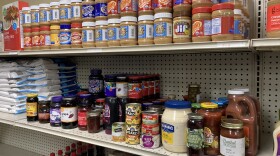The federal government shutdown ended Nov. 12, but some people are still feeling its impact, including those who rely on Wisconsin’s FoodShare program to afford groceries.
FoodShare benefits stopped for a time during the shutdown, disrupting the steady supply of food for many Milwaukee residents. That’s why an emergency community-wide food drive is continuing.
Milwaukee County and the City of Milwaukee are hosting the drive in collaboration with Feeding America Eastern Wisconsin, Nourish MKE and other community partners. Opportunities to donate, volunteer and access food are listed on the county website.
Valerie MacMillan is the executive director at Nourish MKE, the largest network of community food centers in Milwaukee. She gave WUWM's Eddie Morales an update on the organization’s current and future efforts.
This conversation has been edited for length and clarity.
Eddie Morales: What has support from the community been like?
Valerie MacMillan: As a food pantry, we're always facing challenging times for our community members. When it's hitting the wider community and it's hitting so many more people, just knowing that there is care and concern is really incredible to know that so many people want to come together to feed their neighbors.
What has that been like outside of just the government shutdown, which has now ended, but also just the economy overall? Can you speak to those challenges just from the economy?
I don't want people to think that just because the government shutdown has ended that the crisis is over. Even before the shutdown and before the SNAP crisis, we were gearing up for major changes coming next year thanks to the bill that was passed last summer that is going to create even more holes in our not-so-great safety nets that are really going to impact people.
"I don't want people to think that just because the government shutdown has ended that the crisis is over." - Valerie MacMillan
So, people who are now logging into the ACA portal to look at their new health insurance and premiums for next year without those tax credits or the tax subsidies. I talked to one person who said that their insurance is going up $25,000 for their family next year. That's huge. And that's not the only thing — there are work requirements that are being added to SNAP and into Medicaid. There's changes to housing funding and rental assistance. There are going to be reductions in heating assistance for people.
There are so many things that are about to hit everyone. I'm not sure that people really know what the full picture of that is going to be. Until it hits, sometimes you don't see it as something real, but we've been really planning behind the scenes. A couple of months ago, we're thinking our big crisis is going to be starting in January, and then we were hit with this during the shutdown. So, we've already been trying to prepare for next year because there's a lot of uncertainty about what's coming.
What does planning look like for that?
Typically as a nonprofit organization, you want to shore up your funding. That's been really challenging in 2025 because there have been so many reductions in funding across sectors, healthcare research and all kinds of different programming. The funding landscape has changed dramatically for nonprofits, which means that more nonprofits are competing for fewer dollars. There is no amount of private funding that will ever close the gap of what the federal government leaves in its wake when it pulls funding out.
Knowing that funding has been very uncertain, we've been working to build coalitions. We've been building a coalition of food pantries where we're providing mutual aid to one another and support and making sure that we're resource sharing and that we have somebody that we can call when we need something. That's been really fulfilling to be able to make the relationships with all the other food pantries.
As many food pantries as we've been able to connect to across the city, we hope that continues to grow. We're also working in coalitions across sectors to try and connect people who are going in for health appointments to make sure that they're connected and that they have food because it helps support better health outcomes.
So, just trying to build networks of organizations that are working together to meet the need right now, because we know that we can't hoard resources and try and do it alone. So we're trying to band together to find new ways of rebuilding some of the systems that are being destroyed.
How long do you expect people will still need this emergency food? Is there an end to this community effort for this specific initiative, or is this going to be an ongoing thing now because of the uncertainty?
It's one of those things that when the SNAP payments first went through for folks in Wisconsin at least, but not all the way across the country, it was a momentary sigh of relief that people got their benefits. But then everybody's like, what's next? Even our community members feel like now that there's a trust that's been broken because something that they've been able to rely on — even through historic government shutdowns — it doesn't feel as secure anymore.








